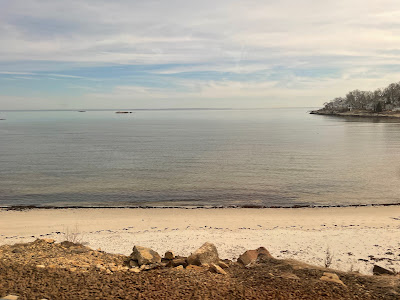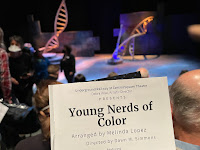 |
| American automotive wasteland, as seen from the Palmetto. |
"The consequence of the projection of national sins, and specifically racism, onto one region is a mis-narration of history and American identity. The consequence of truncating the South and relegating it to a backwards corner is a misapprehension of its power in American history."
--Imani Perry
South to America: A Journey Below the Mason-Dixon to Understand the Soul of a Nation
It's still dark in NYC when I board the Palmetto for South Carolina.
The light emerges almost painfully slowly over the New Jersey marshes and petroleum plants.
By the time we hit Philadelphia, the car fills up. I am one of a small handful of White people on this train of 90+ souls headed south.
It's a 14 hour trip. I chose the railroad over flying for several reasons, the most important of which is that, simply put, flying has one of the biggest negative impacts on our environment.
Commercial air travel accounts for 3 to 4% of U.S. greenhouse gas emissions, and increasing demand for flights is outpacing efficiencies.
Yet still we feel, as White Americans do about so much, that our time is more valuable than the planet.
Off the soap box and onto the train! I'm on the train. I'm on the train. I'm still on the train, 15 hours later. Georgia O'Keefe said about her paintings, "Nobody sees a flower really; it is so small. We haven't time, and to see takes time - like to have a friend takes time."
I'm on my way to see friends. Traveling, like all else, suffers from (White American) demands for immediacy.
We are delayed outside of Richmond, first by a freight train -- Amtrak runs on heavy rail lines for this route -- and then a medical emergency, requiring a wait for EMS services before resuming. Again north of Charleston by a second freight. Freight owns these tracks.
 |
| American freight, Richmond, VA. |
Another reason I chose the train is that flying swiftly over landscapes has always felt to me like an unnatural way to travel. My body misses participating in the geographical changes in color, topography, and climate that occur when we move across hundreds of miles.
The differences between Maine and NYC, or NYC and Charleston, SC are significant both geographically and culturally. They spin out on the other side of the glass as well as on the inside of the train. Freight trains marbled with graffiti. Flat, rolling farmland already dressed in bright spring green. Shadbush in bloom. Richer, warmer skin and vocal tones.
It's a pretty grim weather day, sporting heavy, low-hanging clouds that mute these shifting tones. By Fayetteville, NC rain splatters the windows.
You know that old saying about being on the "wrong side" of the tracks? Facts are being alongside the noise, vibration, and detritus of freight train tracks does not make for optimal locations, so when you're on the train you get a good look at the hidden underbelly of American culture, the places we live and work that you don't see on the internet.
If you've never questioned overconsumption and throw-away consumerism in the U.S., take the train south and keep your eye on the landscape.
In North Carolina, acres upon acres of automotive junk yards spool alongside the tracks. I am astonished, a little fascinated, saddened realizing I've not considered the fate of this centerpiece of American consumerism.
We have junkyards in Maine, too. They can be part of the re-use economy. I've prowled several of them years ago, when parts were more interchangeable and accessible to standard humans: gas caps. Doors. Mirrors. Fenders. Rocker panels. It's the scope, the broad expanses of these tumbled fields of our automotive detritus nestled along the tracks that shocks me.
Where will your vehicle end up when you are ready for a new one?
How much time are you willing (or able: still a privilege) to take to visit friends and family?
Will the changes in the ways the pandemic has helped me to see the world more slowly take root more largely in our cultures?
#autohell
#soulofamerica
#imaniperry
#slowtravel
#georgiaokeefe
#newblogpost
















